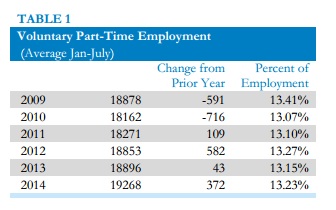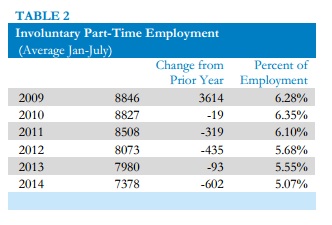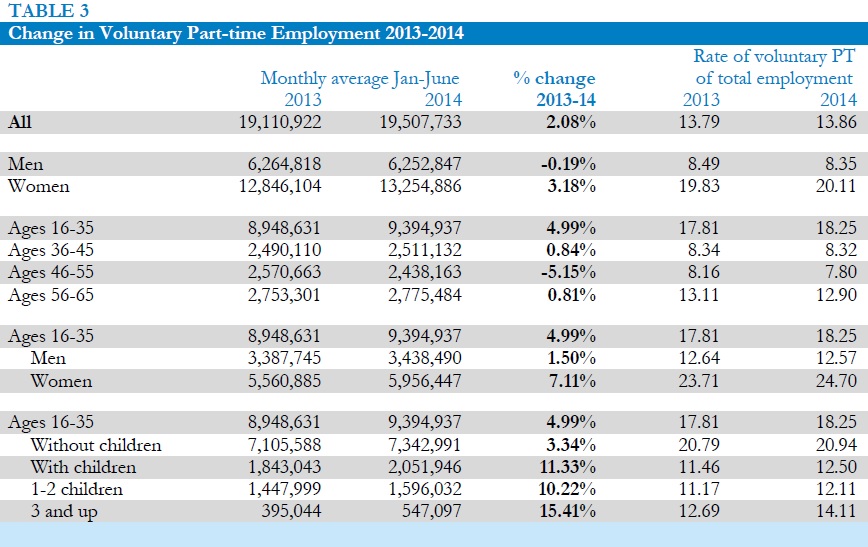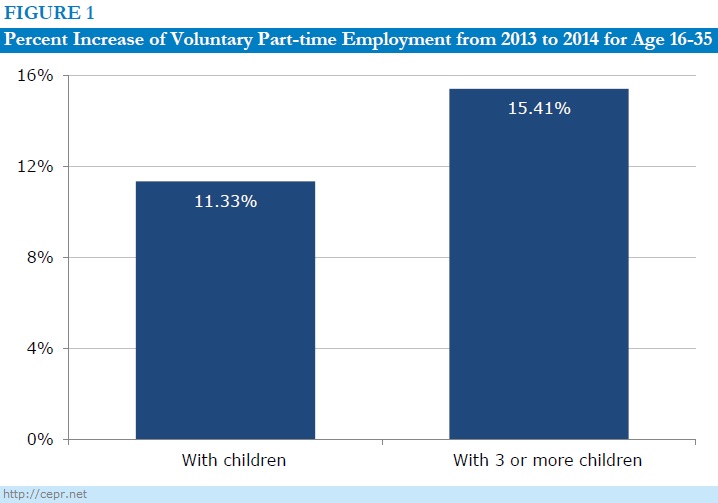September 16, 2014
In a post for the Roosevelt Institute’s Econobytes, Dean Baker, co-director of the Center for Economic and Policy Research, and Helene Jorgensen on how the Afforable Care Act is allowing for voluntary part-time employment.
In today’s EconoBytes, economists Helene Jorgensen and Dean Baker of the Center for Economic and Policy Research on how the Affordable Care Act has contributed to an increase in voluntary part-time employment.By allowing people to buy insurance through the exchanges and extending Medicaid coverage to millions of people, the ACA largely ends workers’ dependence on their employer for insurance.
- This gives tens of millions of people the option to change their job, to work part-time, or take time off to be with young children or family members in need of care, or to retire early.
There has been a notable uptick in voluntary part-time employment in the first seven months that the exchanges have been in operation.
- Table 1 shows that the monthly average of workers who reported they were voluntarily working part-time (less than 35 hours a week) was 372,000 higher in the first seven months of 2014 than in the same months of 2013.
- While this may in part reflect cyclical dynamics (there was a larger increase in 2012), there is not a simple relationship between a strengthening labor market and increased part-time employment.
- Voluntary part-time employment rose by just 43,000 in 2013 and actually fell as a share of total employment.
- Voluntary part-time workers are people who report that they have chosen to work part-time. The number of people who report that they are working part-time but would like full-time employment has been dropping throughout the recovery. This is shown in Table 2.


There is no evidence that employer sanctions in the ACA led to any increase in the number of people involuntarily working part-time.
- There had been concerns that employers would deliberately keep many workers at less than 30 hours a week in order to avoid employer sanctions. These sanctions would penalize firms that employ more than 50 workers for each worker for whom they did not provide insurance.
- While this sanction has been delayed, employers would have expected that it would have been applicable in the first half of 2013 since the Obama administration did not announce the delay until July 2nd of that year.

The biggest increase in voluntary part-time is for young people with children.
- If the extension of coverage under the ACA freed people from having to work full-time in order to get access to health care insurance then we would expect to see the greatest increase in voluntary part-time employment among workers who might prefer to work less than full-time.
- The groups that would most likely fit into this category are workers who have young children or other care-giving responsibilities and older workers who have conditions that make full-time work difficult.
- This latter group likely would have faced high insurance premiums in the individual market before the passage of the ACA. The ACA allows them to buy insurance at a premium that is not affected by their health conditions. Also, it would provide a subsidy for low- and moderate-income households.
- Women accounted for the entire rise in voluntary part-time employment, with an increase of 3.2 percent in 2014 compared with 2013.
- By contrast, voluntary part-time employment for men actually fell slightly.
- Furthermore, it is younger workers, ages 16-35, who account for the bulk of the increase.
- The number of people in this age group voluntarily working part-time rose by 5.0 percent. By comparison it dropped by 5.2 percent for workers between the ages of 45-55. There were small rises of less than 1.0 percent for the other two age groups.
- The percentage of employed young people with children working part-time increased 11.3 percent from 2013 to 2014. For young people with three or more children the percentage working part-time increased by 15.4 percent.

It is certainly too early to make any definitive judgments about the effects of the ACA on the labor market, however these data suggest that it is freeing workers of the dependence on their jobs for their health care.
- In the context of a labor market that is still well below full employment, if some workers voluntarily opt to work part-time it frees up a full-time job for someone who needs fulltime employment.
- If these results hold up in coming years, this will mean that workers are now able to more easily reconcile family obligations with work.






